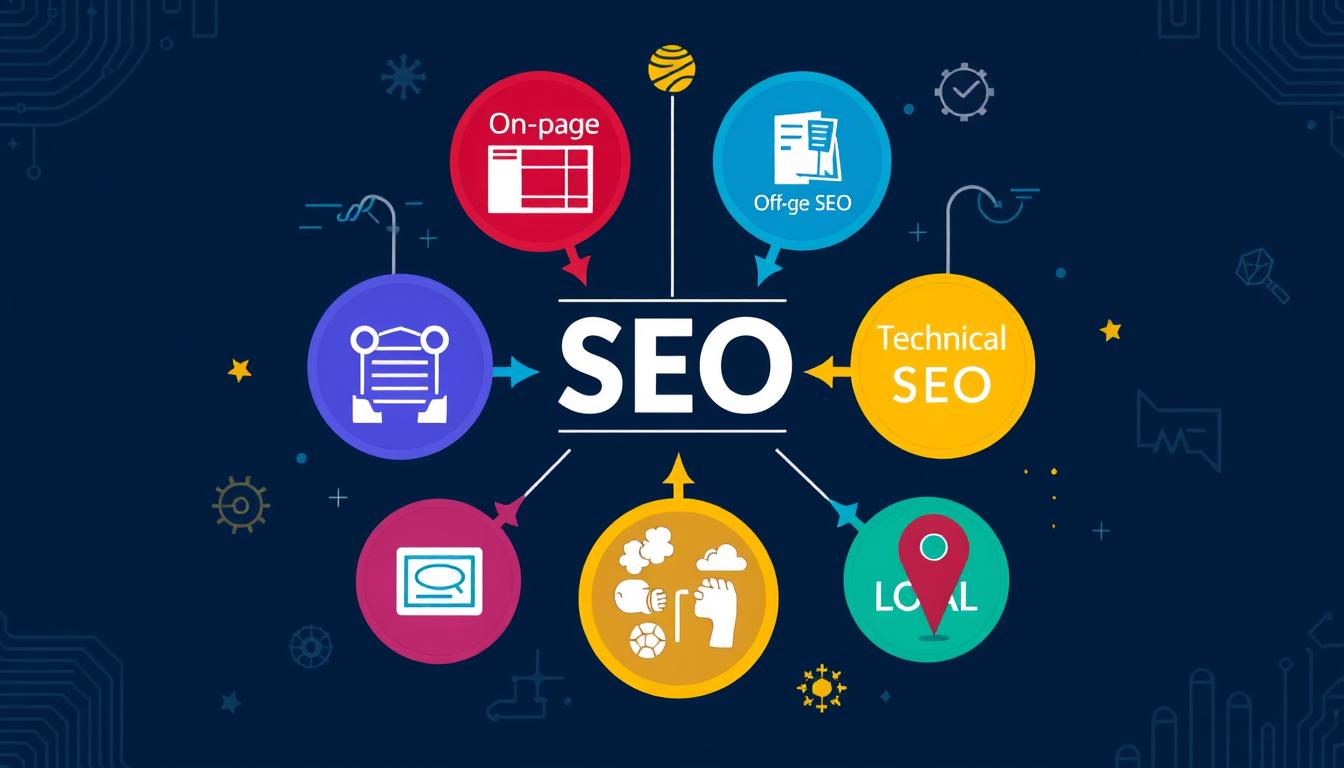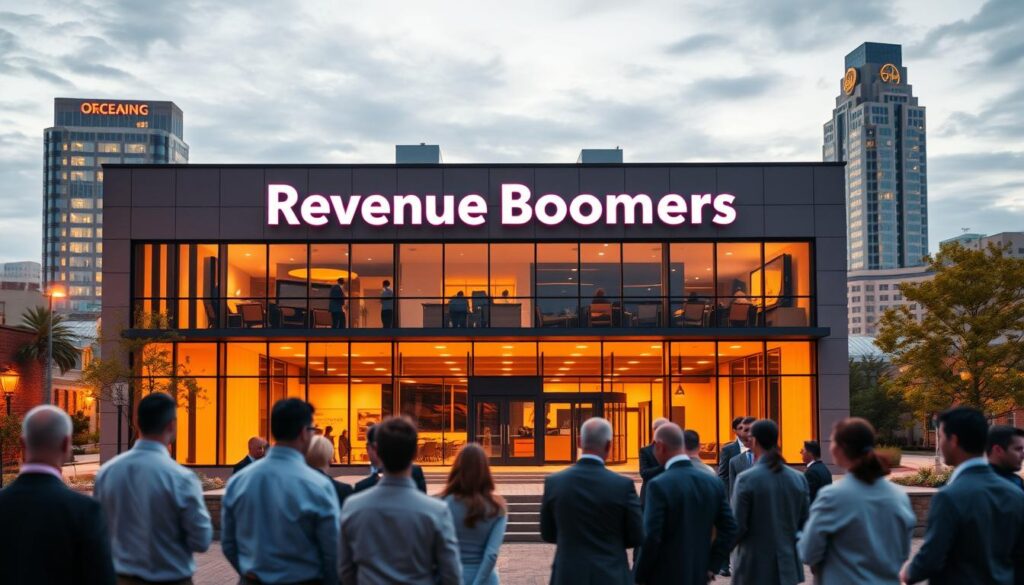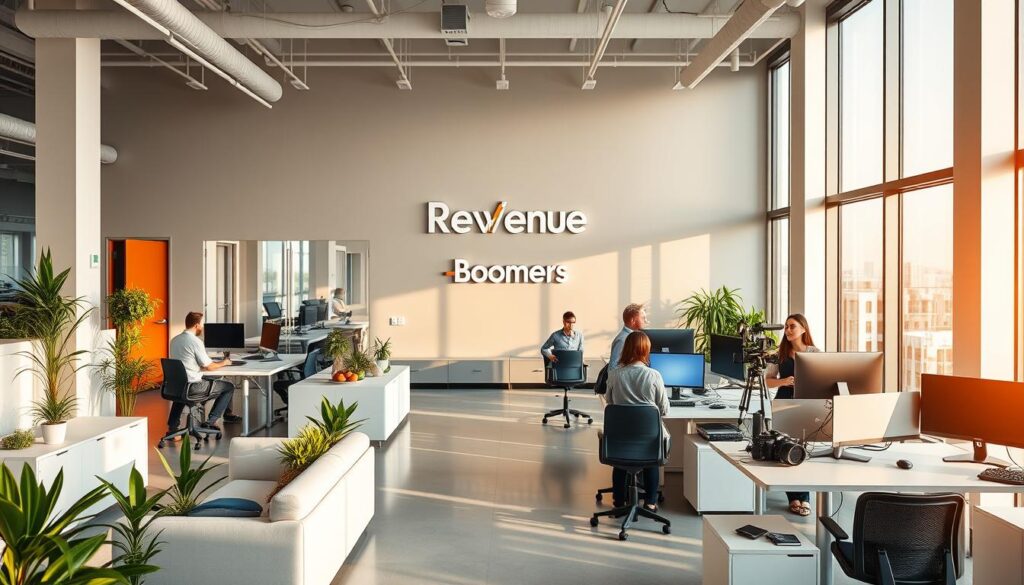Have you ever wondered if your SEO is really working? Or if you might be using old methods that could harm your site? Knowing what SEO is best for you is key. Today, SEO is a must for boosting your online presence and getting more visibility.
SEO helps your site rank better on search engine results pages. It covers on-page SEO and off-page SEO, like backlinks. The debate is about white hat SEO, which is safe, and black hat SEO, which is risky. We’ll look at the best SEO methods and find the right one for your business.
SEO is vital for quick visibility and long-term growth. In this guide, we’ll explore what makes SEO successful.
Key Takeaways
- SEO is critical for businesses to increase organic traffic on SERPs.
- Understanding the balance between white hat and black hat SEO is essential for long-term success.
- On-page and off-page SEO strategies are fundamental in driving website performance.
- Creating high-quality, mobile-friendly content and acquiring relevant backlinks are key for ranking improvements.
- Continuous monitoring and adapting to SEO trends are vital to stay competitive in the digital space.
Introduction to SEO
For businesses looking to grow online, understanding SEO is key. The SEO definition is about using strategies to make a website better. This way, it shows up higher in search results and gets more visitors.
SEO involves many techniques to help search engines see a website’s value. These include using the right keywords, making the site easy to use, and getting quality backlinks. These steps help search engines know what your site is about and where it should rank.
In today’s digital world, using SEO tips is crucial to stand out. With over 4.3 billion pages in Google Index, using good SEO is essential. Companies that focus on SEO can see real benefits and grow over time.
Search engines are important in the digital world, and SEO helps you be seen. Google handles about 3.5 billion searches daily. Businesses need to use SEO to grab people’s attention. Also, posting quality content is important, making up 26% of Google’s ranking factors.
In short, SEO is about making smart choices in content, keywords, and technical aspects. These steps help companies improve their site and get more online traffic. This is how SEO works to help businesses grow.
The Importance of SEO in Digital Marketing
SEO is key in digital marketing. It helps websites get seen and visited more. Companies that focus on SEO see better sales and brand recognition. Studies show that good SEO brings more organic traffic, a big part of online visitors.
High-quality content is a must for SEO success. Content that grabs and teaches people boosts rankings and user satisfaction. Using keywords right in content helps more people find businesses online.
Getting links is also vital for SEO. Activities like social media and backlinks build trust and authority. Backlinks are especially important for better search rankings.
Don’t forget about technical SEO. Website speed, security, and data structure are crucial. A well-organized site helps search engines find and rank it better.
With 49% of shoppers finding new brands on Google, local SEO matters a lot. It helps businesses show up in local searches, boosting foot traffic and sales.
Understanding SEO is crucial for businesses in digital marketing. Good SEO practices lead to a stronger online presence. They help beat competitors and drive growth.

What Type Of SEO is Best?
Knowing the different types of SEO is key for businesses wanting to boost their online presence. There are many strategies to choose from, and picking the right ones is crucial. The main types are on-page SEO, off-page SEO, and technical SEO. Each plays a unique role in making your site more visible and attracting more visitors.
Understanding the Three Types of SEO
On-page SEO makes your website’s pages better for search rankings. It involves using the right keywords and making your site easy to use. This includes things like keyword research and meta descriptions.
Off-page SEO builds your site’s authority through external actions. It includes guest blogging and improving your brand’s online presence. These efforts help increase your site’s traffic and reputation.
Technical SEO focuses on the site’s backend. It’s about making your site fast, mobile-friendly, and easy for search engines to find. Fixing these technical issues can greatly improve your site’s ranking.
Choosing the Right Type for Your Business
Picking the right SEO type depends on your business goals and audience. Think about these factors:
| Type of SEO | Key Focus Areas | Ideal for… |
|---|---|---|
| On-Page SEO | Content quality, keyword optimization, user engagement | Content-driven websites |
| Off-Page SEO | Backlinks, social media marketing, brand authority | New or growing brands |
| Technical SEO | Site speed, mobile usability, indexing | Websites with structural issues |
By understanding your needs and mixing these strategies, you can boost your search engine visibility. For more information, check out the different SEO types to see which one suits your business best.
On-Page SEO: Best Practices
On-page SEO is key to making webpages more visible. It involves optimizing titles, headings, and links. This helps attract more visitors and boost rankings. Good on-page optimization can also improve user satisfaction.
Content Optimization Techniques
Using specific content strategies is crucial for search relevance. Some important techniques include:
- Writing original content that meets user needs.
- Placing keywords wisely in the content.
- Optimizing title tags and meta descriptions for better visibility.
- Creating easy-to-read URLs.
- Using headings to make content easier to understand.
Adding visuals like images and infographics can also help SEO. Page speed and mobile friendliness are important for a good user experience.
The Role of Metadata
Metadata is very important for on-page SEO. It helps search engines understand webpages better. This leads to better rankings for relevant searches. Key metadata components include:
- Meta descriptions that boost click-through rates.
- Image alt-text for image search traffic.
- Structured markup for better search result display.

Using these practices in your SEO strategy can improve its effectiveness. Regularly check and update your content and metadata to stay visible in search engines and serve users better.
| On-Page Element | Importance | Best Practices |
|---|---|---|
| Title Tags | Critical for search engine rankings | Include primary keywords and keep it under 60 characters |
| Meta Descriptions | Affects click-through rates | Craft compelling summaries under 160 characters |
| Headings | Structuring content for readability | Use H1 for titles and H2, H3 for subtitles |
| Internal Links | Enhances site navigation and mapping | Link to relevant pages within your site |
| Image Alt-Text | Drives traffic from image searches | Describe images accurately using keywords |
Technical SEO: Enhancing Website Performance
Technical SEO is key to making sure a website meets search engine needs. It focuses on the backend parts that affect how well a site works. Good technical SEO practices improve user experience and help a site show up more in search results.
Core Web Vitals Explained
Knowing the core web vitals importance is crucial. These metrics check page speed, how fast it responds, and if it looks stable. They are the heart of user experience. Here are the main parts of core web vitals:
- Loading Performance: How fast a page loads, which keeps users interested.
- Interactivity: How quickly users can start interacting with the page.
- Visual Stability: Making sure the site looks the same while it loads.
Boosting these core web vitals can really help a site rank better in search engines. This can bring more organic traffic to your site.
Site Structure and Its Importance
A well-organized site structure is essential for search engines to crawl and index it well. A clear layout helps both users and search engines find content easily. Here are some tips for a well-structured site:
- Avoid orphan pages to make content easier to find.
- Submit an XML sitemap to Google to help find pages.
- Use “noindex” and “canonical” tags to manage how pages are indexed.
- Make sure all pages use HTTPS to keep user data safe and follow ranking rules since 2014.
Having a good internal linking strategy and optimized URLs can greatly improve SEO rankings. This helps spread page authority and boosts user engagement. By following these technical SEO tips, you’ll not only make your site perform better but also give users a better search experience.
| Website Performance Factors | Importance |
|---|---|
| Page Speed | Key for user satisfaction and search ranking. |
| Mobile-Friendliness | Critical due to Google’s mobile-first indexing. |
| Logical Site Structure | Facilitates easier navigation and indexing. |
| HTTPS Security | Essential for protecting user data and SEO compliance. |
| Internal Linking | Distributes authority and enhances SEO performance. |
Off-Page SEO: Building Authority
Off-page SEO is key to making a website more credible and improving its search rankings. Backlinks are very important because they show trust from one site to another. When you get backlinks from trusted sites, your website’s ranking can go up.
The Power of Backlinks
Backlinks are the top factor for Google in off-page SEO. The more quality backlinks you have, the higher your website can rank. There are two main types of backlinks: natural links and self-promoted links.
Getting links from sites like LinkedIn and Instagram can really help your off-page SEO. This boosts your website’s authority.
Strategies for Increasing Domain Authority
To boost domain authority, you need good strategies. Guest posting on blogs is a great way to share your knowledge and get backlinks. It also brings in more visitors and makes your site more credible.
Social media marketing helps too. It increases traffic and makes your brand more known. Being active on Facebook and Twitter can help get more links naturally.
For more tips on off-page SEO, check out this resource. Using these strategies can really improve your website’s ranking and authority.

Effective SEO Techniques for Content Creation
Creating an effective SEO strategy means learning key techniques for better visibility and engagement. It’s important to balance quality and quantity in your content. Even though longer articles often rank higher, each piece must focus on quality to keep readers interested.
Quality vs. Quantity in Content
It’s crucial to aim for both quality and quantity. High-quality content not only ranks better but also attracts backlinks, which boost your domain authority. A study by Stone Temple Consulting shows links are key for Google rankings, making quality content essential.
For the best results, aim for content around 1,400 words. But remember, it must be valuable and insightful.
Engaging Different Content Types
Using various content types can improve user engagement and keep them coming back. Videos, infographics, and detailed articles can attract a wider audience. It’s also important to use internal links wisely to boost rankings.
Creating engaging content increases the chance of getting backlinks from trusted sources. Tools like Semrush can help with competitor analysis and finding the right keywords.
| Technique | Description | Impact on SEO |
|---|---|---|
| Keyword Gap Analysis | Identifying keywords competitors rank for that you do not. | Enhances keyword targeting strategy. |
| Broken Link Building | Leveraging competitor’s broken links for backlinking opportunities. | Strengthens link profile and domain authority. |
| Digital PR | Using press releases and data-driven content to generate backlinks. | Increases visibility and attracts links. |
| Unlinked Brand Mentions | Finding mentions of your brand that don’t link back for conversion. | Creates new backlinks and improves authority. |
| Topic Clusters | Organizing content around specific themes to show expertise. | Enhances ranking potential on Google. |
| Disavowing Toxic Links | Identifying and disavowing harmful backlinks. | Protects website from negative impacts on rankings. |
SEO Strategies for Small Businesses
Small businesses face big challenges when competing with larger companies. SEO is a cost-effective way to boost online presence without spending a lot. It helps improve website traffic, making brands more visible.
Local SEO is key for small businesses. It helps attract nearby customers. With 72% of people preferring local stores, it’s a smart move. It also boosts organic traffic and revenue by 53% and 44%, respectively.
Good SEO needs quality content, the right keywords, and strong backlinks. Regular updates keep customers interested. Also, technical audits help find areas for improvement.
SEO results may take time, but steady work pays off. Working with SEO agencies can help small businesses. With Google handling over 92% of searches, optimizing for it is crucial.
Monitoring and Analyzing SEO Performance
To keep improving your SEO, it’s crucial to monitor and analyze your performance. Using SEO tools helps you understand how well your website works and how users interact with it. This knowledge lets you make smart choices and adjust your strategies to grow.
Tools for Measuring SEO Success
There are many SEO tools that help measure success. These tools give you important data on how well your SEO is doing. They show you what’s working and what needs improvement:
- Google Analytics: Tracks organic traffic, user behavior, and conversion rates.
- SEMrush: Offers insights into keyword rankings and competitive analysis.
- Google Search Console: Monitors site health, indexing status, and SERP visibility.
- Moz’s Rank Tracker: Focuses on tracking keyword positions and backlinks.
Key SEO Metrics to Track
It’s important to watch a few key metrics to see how well your SEO is doing:
| Metric | Description | Importance |
|---|---|---|
| Organic Traffic | Visits from non-paid search outcomes. | Indicates overall SEO effectiveness. |
| Keyword Rankings | Positions in search engine results for target keywords. | Shows website visibility. |
| SERP Visibility | Frequency and prominence in search results. | Measures reach in target market. |
| Impressions | Number of times pages are shown in search results. | Reflects potential traffic. |
| Click-Through Rate (CTR) | Percentage of clicks out of impressions. | Assesses title and meta description effectiveness. |
| Conversions | Completed desired actions by visitors. | Indicates site effectiveness in achieving goals. |
| Bounce Rate | Percentage of visitors leaving after viewing one page. | Indicates content relevancy and engagement. |
| Website Health Score | Assessment of site performance out of 100%. | Helps in prioritizing SEO efforts. |
Common SEO Mistakes to Avoid
Many businesses face SEO pitfalls that hurt their online presence. It’s key to know these common SEO errors to boost search rankings. A big mistake is not doing enough keyword research, making content that misses the mark with what people search for.
Keyword stuffing is another big no-no, as it can get you penalized by search engines. It makes your content less valuable and less user-friendly. Also, forgetting to use meta tags can make your site harder to find, leading to fewer visitors and sales. Learning how to avoid these mistakes can make your SEO better.
Not optimizing images is another common error. If images aren’t optimized, they can lower your site’s ranking and miss out on visitors. Plus, having a site that’s not mobile-friendly can scare off smartphone users, hurting your visibility online.
A bad linking strategy can also hurt your site’s performance. It can lead to broken pages and a worse user experience. Making sure your URLs are set up right is important, as duplicate content can harm your rankings.
Ignoring how users experience your site can lead to bad reviews, hurting your SEO and reputation. Not using analytics tools makes it hard to see how well your keywords are working, making it tough to improve SEO strategies.
| Error | Impact | Recommended Solution |
|---|---|---|
| Poor keyword research | Content not found | Conduct regular keyword analysis |
| Keyword stuffing | Penalties from search engines | Maintain natural keyword flow |
| Ignoring meta tags | Reduced visibility | Optimize meta tags |
| Image optimization neglect | Low rankings | Properly optimize images |
| Lack of mobile optimization | Lost smartphone users | Create mobile-friendly designs |
| Poor linking strategy | Reduced crawlability | Enhance internal and external links |
| Improper URL structure | Duplicate content issues | Use clear URL structures |
| Ignoring user experience | Negative reviews | Focus on user-friendly design |
| Lack of analytics | Poor tracking capabilities | Utilize analytics tools |
Conclusion
When we look at SEO strategies, it’s clear that a mix of approaches is key. An effective SEO plan includes on-page, off-page, and technical SEO to make your site more visible. Good content and smart keyword use are crucial for getting more visitors.
Link building and social media help strengthen your brand’s online presence. Using different strategies that fit your business can really improve your search rankings. It’s important to keep checking and updating your SEO to stay competitive.
Experts, like those at Revenue Boomers, can offer great advice to improve your SEO. Getting help from professionals is a smart move to get the best results from your SEO efforts.
Knowing how SEO works gives businesses the tools they need to succeed over time. By using effective strategies, companies can grow their online presence and connect with their audience in meaningful ways.






